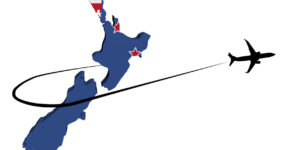Government Criminalises Aussies Who Use Travel Bubble as a Stepping Stone

The Australia / New Zealand bilateral ‘travel bubble’ came into effect on 19 April 2021, enabling Australian residents to travel across the Tasman without having to obtain authorisation from the Australian government.
But in a pre-emptive move to prevent citizens and permanent residents from using our Kiwi neighbour as a stepping stone to other countries, Federal Health and Aged Care Minister Greg Hunt invoked his powers under sections 44(2) and 477(1) of the Biosecurity Act 2015 (Cth) to make the Biosecurity Legislation (Human Coronavirus with Pandemic Potential) Amendment (No. 1) Determination 2021 (the Determination).
The Determination was made on 18 April 2021 and came into effect the next day – the same day of the bilateral bubble’s commencement, which was facilitated by the same instrument.
What are the rules?
The Minister’s Determination amends the Biosecurity (Entry Requirements—Human Coronavirus with Pandemic Potential) Determination 2020 to require Australian citizens and permanent residents who travel from Australia to New Zealand pursuant to the ‘travel bubble’, and then on to another country, to provide a signed statement to officials on their return to Australia declaring that they:
- Left Australia to travel to New Zealand, and
- Travelled to the foreign country or countries for a ‘compassionate reason’ or ‘urgent medical treatment that was not reasonably available in Australia or New Zealand’.
The statement must also provide the traveller’s name, date of birth, passport number, phone number in Australia, intended address in Australia, email address and flight number, as well as information regarding:
- Whether he or she has ‘signs or symptoms of human coronavirus with pandemic potential’, and
- Whether he or she has been exposed to human coronavirus with pandemic potential in the past 14 days,
What counts as an exemption?
The Determination does not provide a list of what may constitute a compassionate reason for travelling to another country from New Zealand.
However, Note 1 of the Determination states:
‘an example of a compassionate reason for an individual is the death or serious illness of a close family member of the individual or of a close family member of the spouse or de facto partner of the individual’.
There is no such guidance as to ‘urgent medical treatment that was not reasonably available in Australia or New Zealand’.
What are the potential consequences of breaching the rules?
Breaching the Determination carries potential consequences under both the Biosecurity Act 2015 and the Criminal Code Act 1995.
Biosecurity Act
Section 479 of the Biosecurity Act 2015 (Cth) makes if a criminal offence punishable by up to 5 years in prison and/or a fine of 300 penalty units (or $63,000, as a Commonwealth penalty unit is currently $210) to contravene a direction made under section 477 of the Act – which is the section pursuant to which the Health Minister made the relevant Determination.
In addition to this, section 532 of the Act prescribes a civil penalty of up to 60 penalty units (currently $12,600) for giving information in compliance or purported compliance with the Act while knowing the information is false or misleading or by omitting any matter or thing without which the information is misleading.
Section 533 of the Act imposes the same 60 penalty units maximum penalty for producing a document to another person in compliance or purported compliance with the Act while knowing that the document is false or misleading.
Criminal Code Act
The Criminal Code Act 1995 (Cth) prescribes criminal penalties for conduct similar to that covered by sections 532 and 533 of thew Biosecurity Act.
In that regard, section 137.1 of the Criminal Code Act 1995 prescribes a maximum penalty of 12 months in prison for providing false or misleading information, or omitting any matter or thing without which the information is misleading, where the information is given to a Commonwealth entity exercising powers or functions under a law of the Commonwealth.
The Australian Border Force is a Commonwealth entity and its officers are exercising a Commonwealth function when receiving a statement given pursuant to the Minister’s Determination.
Section 137.2 of the Criminal Code Act prescribes the same maximum penalty of 12 months in prison for produces a document in compliance with a Commonwealth law (which includes the Determination) knowing that the document is false or misleading.






